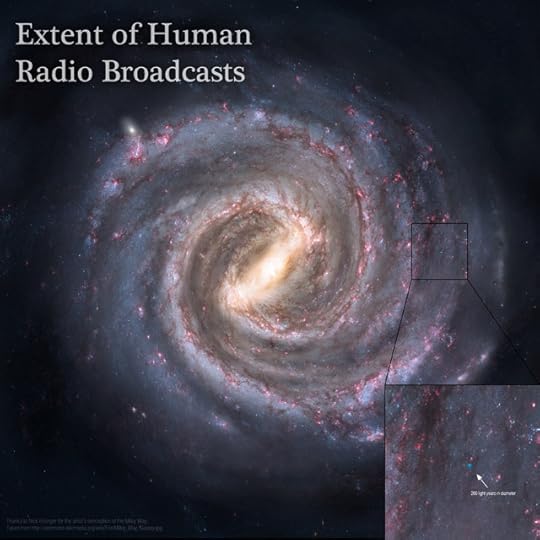My thoughts on alien life are simple. Ask yourself this question: Is there life in outer space?
This is where people think there’s some debate, but there’s actually no debate at all. The answer is an unequivocal yes.
We know with 100% certainty that there is life in outer space because there’s life on Earth, and Earth is in outer space. Now, it might sound as though I’m cheating you out of an answer, but this point is actually quite relevant. For thousands of years, our cultures and religions have been ego-centric, thinking of themselves as the center of everything. And so we see Earth as one thing and outer space as something else when that’s not true. Earth is a tiny planet in a modestly sized solar system, orbiting a rather ordinary star on a spiral arm of an unassuming galaxy that is one among roughly four hundred billion other galaxies. The real question is… Is there any other life in outer space? And the answer is, if there’s life here, there’s no reason to assume there couldn’t be life elsewhere.
Statistically, it would be highly unlikely that Earth is the only place with life/intelligent life.
Think about how rare black holes are compared to stars. Then think about how rare it is for two black holes to collide. When the LIGO gravitational wave detector was first set up, the team thought that, if they were lucky, they might observe one or two collisions a year. When the scientists switched LIGO on, they found four collisions in the first week! And LIGO can only detect gravitational waves from a very small band of black holes, not all black holes, and yet the universe is ringing with these collisions happening all the time!
What this highlights is how, when you have astronomically large numbers, even rare events can be quite common. It sounds contradictory, but the same holds true for things like people dying from falling off a ladder or slipping over in the bathroom. You or I would consider this a rare, unlikely event, but 45,000 people die from falls in the US each year. It’s not that bathrooms and ladders are inherently dangerous so much as that there’s an astronomically large population of 330,000,000 people in the US, so this seemingly rare event (0.0015%) is actually quite common.
When you consider the size of the universe, there are 10^26 stars, that’s 100,000,000,000,000,000,000,000,000 stars! So how frequent is life? Well, it is at least one in 10^26 as we’re here, but is it really that low? What if it was astonishingly rare, occurring only around one in a billion stars? Although that sounds rare, if it were true, then there would be 200 instances of life arising in just our galaxy alone as we have somewhere around 200 billion stars!
Or what if life was rarer still, at just one in a trillion stars? Well, then there would still be 100,000,000,000,000,000 planets teeming with life in the universe (10^17), but being one in a trillion, there would only be one in our galaxy (as we only have around 200 billion stars, so we’d be an outlier).
In short, I think there is no reason not to think there’s life elsewhere; it’s probably just so remote we’ll never find it, given the sheer size of the universe. Jill Tartar, the head of NASA SETI, said, “If you equate all the stars in the universe to the oceans of the world, then we’ve searched the equivalent of a bathtub looking for life.”
I suspect life is out there, but I doubt we’ll ever find it. If our bathtub is on the shore of a small bay on the coast of Norway, and life is teeming in the Pacific, it’s likely we’ll never see it at all.
Imagine you’re an extraterrestrial looking for other intelligent life forms in the galaxy, and you suspect there’s someone like us out there, so you decide to listen for us. What would you hear? Nothing. That tiny blue dot in the image below is the extent of how far our radio and television have reached. Unless ET was in a nearby star, something that doesn’t seem likely, they’d have no idea about us for thousands to tens of thousands of years. Given our galaxy is 100,000 light-years in diameter, if they’re holding a party on the other side of the Milky Way, and even if they had sensitive enough equipment, they won’t know about us for a very long time.
Is there life in outer space? Yes—us! Is there any other life in outer space? Probably, but it may be so isolated that it’s impractical to ever detect, let alone visit.

 newest »
newest »
 newest »
newest »
 Yeah, like I say to those people who claim there is extraterrestrial life, "sure I believe there is too, what I can't say is that I know there is and it would seem like an awfully cold and lonely universe if humans were the only intelligent life in it (even if "intelligent" seems a bit far fetched at times). And if we are alone, imagine what a mess we'd make of it ... you only have to look at how we're screwing this planet up to get an idea of that.
Yeah, like I say to those people who claim there is extraterrestrial life, "sure I believe there is too, what I can't say is that I know there is and it would seem like an awfully cold and lonely universe if humans were the only intelligent life in it (even if "intelligent" seems a bit far fetched at times). And if we are alone, imagine what a mess we'd make of it ... you only have to look at how we're screwing this planet up to get an idea of that.





